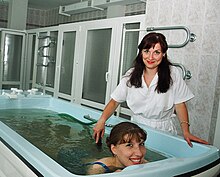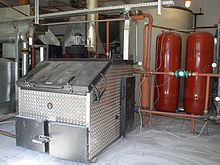Children's recreation center Nadezhda
The children's recreation center "Nadeschda" (German: Hope) on Lake Wilejka near Vilejka in Belarus has been a model project that has been functioning since 1994 for the recovery and rehabilitation of children who live in the radioactively contaminated regions, especially in south-east Belarus. Around 6,000 children come there every year. Nadeshda is a successful project for dealing with the consequences of the Chernobyl disaster on April 26, 1986 in solidarity .
Emergence
The establishment of the center is related to the project of reconciliation between Germans and the peoples of what was then the Soviet Union at the end of the 1980s. Participants in the 2nd political pilgrimage to Belarus in September 1989 were asked for support in dealing with the consequences of the Chernobyl disaster, as the size of the problems far exceeds the possibilities of the relatively small country. About 70 percent of the radioactive fallout fell over the south-east of the country and permanently contaminated 23 percent of the territory. The people of Belarus only found out about this in 1989, when the Soviet leadership finally allowed the publication of radiation maps. Chernobyl aid associations were set up in several places across Europe. Their task was to invite children to relax in Western Europe or to support medical facilities. So in the early 1990s the idea of a children's recreation center in Belarus was born. The men's work of the EKD (then Frankfurt am Main ), the association “Life after Chernobyl” Frankfurt am Main and the “Belarusian Ecological Union” in Minsk took part as partners . The aim was to increase the completely inadequate number of sanatorium places in Belarus.
In 1992 the idea was developed to establish a recreation center in Belarus in partnership, which increased the number of sanatorium places and enabled children to relax all year round in their own country with European standards. This should contribute to better future prospects for the children and enable them to live in their own country instead of emigrating.
In 1992 the Belarusian-German non-profit joint venture '' Nadeshda 21st Century '' was founded. An empty branch of the Biological Faculty of the University of Minsk in the nature reserve on Lake Wilejka will be made available for the center and will be converted and expanded into a modern center in the following years with the active participation of engineers, craftsmen, Bundeswehr soldiers, trainees and other volunteers, especially from Germany . Inauguration is on September 24, 1994.
Issues and priorities
A progressive and holistic recreational and educational concept developed by an international team of experts was developed for the center and is constantly being further developed. The aim is a facility with standards that are common in western countries.
- Medical rehabilitation and recovery : Especially children and adolescents who are exposed to strong radiation every day suffer from health consequences. Many have a weak immune system, diseases of the respiratory organs, the digestive tract, the organs of vision (cataracts), cardiac arrhythmias, an underactive thyroid and diabetes. There are also different forms of cancer. In the center there is qualified medical treatment by specialist staff and in well-equipped rooms (e.g. department for medical baths). A sports hall is available for sporting activities. The construction of a swimming pool is planned. Value is placed on healthy nutrition through organic food grown in-house.
- Definition of education : Holistic education is promoted, which aims to strengthen the child's personality and encourage participation in social processes. Since a regular stay lasts 24 days, the children get school lessons. The center has its own school, which is officially run as a branch of the school in nearby Ilya. In addition to school lessons, there is “circle work” in the center (e.g. ceramics, music, computer graphics, photography, etc.), which is intended to help children discover their talents and develop self-confidence and a sense of responsibility. An important part of the concept is the exchange with children and volunteers from abroad (Germany, Italy, Ireland, Japan, Scotland ...). Encounters with disabled people are playing an increasingly important role. Work is currently underway to make disabled work a new focus of the center.
- Promotion of ecological agriculture and alternative energies : In order to ensure a healthy diet with fresh, unpolluted food, the "Nadeshda Plus" department was founded in 1999. It produces fruit and vegetables on 27 hectares according to the criteria of near-natural agriculture and operates its own beekeeping. It also takes care of the wood that is burned in the centre's wood chip plant. 100% of the heating requirement now comes from this renewable energy source. On the occasion of the 30th anniversary of the Chernobyl disaster on April 26, 2016, the foundation stone for a photovoltaic system is to be laid. The complete changeover of the Nadezhda center to renewable energies is of great symbolic importance for Belarus, as it shows, on a small scale, the possibility that an energy turnaround is also possible in Belarus. Nadeshda received the status of a demonstration zone for high energy efficiency in Belarus in 2004 and was the first social institution to introduce an environmental management system according to EMAS in Belarus in 2008.
numbers
In 2015 there were around 6,400 people (children and accompanying persons) in Nadezhda for spa treatment and relaxation. The majority (approx. 4000) were children and young people with their teachers from the territories contaminated with the radionuclides, who are entitled to such rehabilitation measures according to the laws of the state. In addition, around 500 children and mothers came to the “Mother and Child” program and around 350 disabled children and young people with accompanying persons. In order to finance the additional costs for the holistic offers of the center, Nadeshda has been accepting free, self-paying guests to relax in times when capacities are not fully utilized. In 2015 that was around 1300 people. At the beginning of 2016, the workforce consisted of 216 people, including 35 in the medical department and 28 in the pedagogical department.
financing
The center's budget in 2014 was the equivalent of 4.1 million euros. The company is financed by reimbursements from the state for the statutory rehabilitation measures and by the proceeds from guests who pay themselves. Due to the high inflation in Belarus there are always financial bottlenecks. So far, they have been overcome through clever planning and development of new sources of income (taking in self-paying guests, etc.).
Large investments such as the expansion of the cafeteria, the construction of the sports hall or the planned swimming pool are financed by grants from the state and by significant contributions from the German shareholders. Until 2003, the federal state of Hesse made larger sums available. The Evangelical Church of Hesse-Nassau (EKHN) has also repeatedly supported Nadeshda.
The photovoltaic project (1st construction phase: approx. 260,000 euros) is financed by donations and contributions from German friends. It is expected that part of the children's recreation can be financed from the electricity feed-in tariff (which is 2.7 times the “normal” state purchase price for electrical energy in Belarus).
Sponsorship
The center is supported by the Belarusian-German joint limited liability company “Rehabilitation and Recreation Center Nadezhda”.
Partners are on the Belarusian side
- The "Living Partnership Minsk" Fund
- Belarusian State Department for Chernobyl Issues -
On the German side, the partners are:
- The association "Freunde Nadeshdas" eV, in which the previous German sponsors and new sponsors have been united since 2015: - Life after Chernobyl eV Frankfurt am Main - Men's work of the EKD, Hanover - Social service for Protestant men in Westphalia - Project group Children of Chernobyl eV Bad Schwalbach - Friends of the Children of Chernobyl Württemberg eV (since 2015) - Bottrop citizens enthusiastic about their work (BOBBIES) eV (since 2015) - Children of Shitkowitschi - Life after Tschernobyl eV (since 2015) - Landesverband Westfalen und Lippe der Kleingärtner eV (since 2015). Web links of the organizations below. In addition, the center is supported by Italian (Legambiente environmental organization, Solidarieta Dept.), Irish (Chernobyl Children's Trust) and Japanese (Chernobyl Children's Foundation, Tokyo) Chernobyl aid associations.
Achievements and Awards
Nadeshda plays a special role among the total of 9 rehabilitation and children's recreation centers in Belarus (Nadehsda; Shdanowitschi in the Minsk region, Switanok; Kolos in the Brest region, Sidelniki, Ptich, Praleska in the Gomel region, Shemchushina in the Vitebs region and Lesnaya polyana in the Grodneo region) a. Together with the Ökodom of the German organization Heim instead of Chernobyl, it is the only joint Belarusian-German humanitarian-social project that works in the long term.
In the evaluation of the children's recreational facilities carried out annually in Belarus, Nadesdha has always been ranked first or second in recent years.
In 2004 the center was awarded the Honorary Certificate of the Council of Ministers of Belarus.
The transnational partnership project also received attention and recognition in Germany. There were several prizes including:
- 1999 Humanitarian Aid Prize for Central and Eastern Europe from the Robert Bosch Foundation
- Young Paths in Europe funding competition: The 2006 project week of the König-Heinrich-Gymnasium in Fritzlar on the 20th anniversary of Chernobyl in
- Special price 2011 as part of the game room price
swell
- Astrid Sahm, Watscheslaw Makuschinski: Partnership in the name of the future. In: International Education and Meeting Center Minsk (ed.): Chernobyl and the European solidarity movement. 2004.
- Gemma Pörzgen: Holidays from the rays. Aid campaigns for the Chernobyl children. In: Karl-Heinz Karisch, Joachim Wille (ed.): The Chernobyl shock. Frankfurt am Main 1996.
- Melanie Brandt: Uncertainty before and after the disaster. From the anti-nuclear movement to commitment to the "Chernobyl children" [1]
- Annegret Jakobs: We stand together. In: Stuttgarter Zeitung. February 21, 2015.
- Daily bread is irradiated. In: Frankfurter Rundschau. February 27, 2009.
Web links
Individual evidence
- ^ Elisabeth Roth, Fred Dorn (ed.): Political pilgrimage to Chatyn. A trip for peace and reconciliation to the Soviet Union . Gütersloher Verlagshaus Gerd Mohn, Gütersloh 1989, ISBN 3-579-01999-6 .
- ^ Peter Junge-Wentrup, International Education and Encounter Association Dortmund (ed.): Tschernobyl. People-places-solidarity. Information brochure on the Chernobyl disaster Accompanying material for the exhibition of the same name . Dortmund 2013, p. 34 .
- ^ Leben nach Tschernobyl eV March 2, 2016, accessed on March 2, 2016 .
- ↑ trainees
- ↑ Flyer "Solarsolidarität" on the appeal for donations by Leben nach Tschernobyl eV. Accessed on December 16, 2016 (German).
- ↑ Foundation ( Memento of the original from June 13, 2010 in the Internet Archive ) Info: The archive link has been inserted automatically and has not yet been checked. Please check the original and archive link according to the instructions and then remove this notice.
- ↑ Nadeshda ( Memento of the original from June 13, 2010 in the Internet Archive ) Info: The archive link was inserted automatically and has not yet been checked. Please check the original and archive link according to the instructions and then remove this notice.
- ↑ travel price
Coordinates: 54 ° 28 ′ 48.6 " N , 27 ° 12 ′ 48.8" E






